ICO Analysis: Dispatch Labs ICO Review
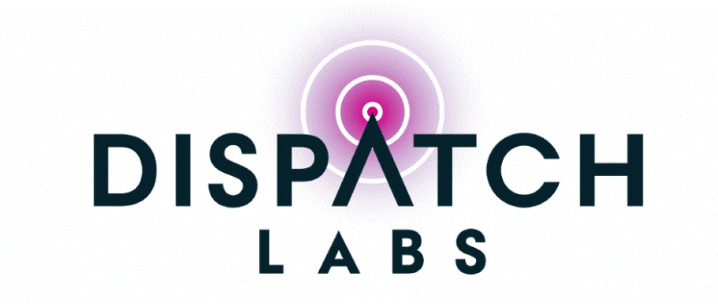
Dispatch Labs ICO Review: A comprehensive review and analysis on Dispatch Labs ICO, which aims to create enterprise-grade blockchain solutions.
This represents the writer’s personal opinions and does not – in any way- constitute a recommendation of an investment or financial advice. Please assume caution when investing in cryptocurrencies and do so at your own risk, as it is extremely volatile and you can lose your money.
Overview
Dispatch Labs is creating a decentralized blockchain that supports smart contract functionality and utilizes an off-chain distributed storage network. This is similar to a traditional ‘Software-as-a-Service’ (SaaS) architecture; but instead of being managed and controlled by a central entity, smart contracts will be programmed to govern data access.
Dispatch Labs is built on 3 core features:
Scalability: Dispatch allows firms to set up data-intensive business logic on a public ledger without sacrificing speed or security, which is an inherent trade-off issue that blockchains face today. The Dispatch ledger has the capacity to facilitate 10,000 Transacations Per Second (TPS) under normal conditions.
Massive Data Capabilities: Allows smart contracts to access big data off-chain (known as ‘artifacts’)
Backward Compatibility: Dispatch Lab’s protocol is backwards compatible with Ethereum smart contracts since it is a modification of the Ethereum Virtual Machine (EVM), and is additionally built to support access to off-chain artifacts
(Read more: Guide To Cryptocurrency Valuation: A Look into On-Chain Data)
Interview with Founders
We had the opportunity to engage in a high-level interview with Dispatch Lab’s CEO (Matt) and CTO (Zane). We asked several important questions about Dispatch Labs according to several metrics. Have a look at the interview below:
Application
There are 2 main components of Dispacth Lab’s solution: 1) The Dispatch Ledger & 2) Dispatch Artifact Network (DAN)
1. Dispatch Ledger
Dispatch is creating a native blockchain that is a modification of the Ethereum Virtual Machine (EVM), with an extension of functionalities that supports programmable access (via smart contracts) to an off-chain storage network. The consensus mechanism employed by Dispatch’s blockchain is Delegated Asynchronous Proof-of-Stake (DAPoS), a new and novel consensus that allows for much higher transaction throughput and incur significantly reduced fee as compared to other blockchains. The Dispatch ledger has the capacity to facilitate 10,000 TPS under normal conditions, and theoretically over 100,000 TPS under perfect conditions. Here’s a comparison of the transaction speeds of major blockchain protocols.
In the DAPoS system, transactions are validated and secured by delegates that have been chosen by token holders. In order to preserve a degree of decentralization, elected learners are chosen by token holders to hold elected delegates accountable for their actions.
Here are the roles of stakeholders in the Dipatch Ledger (or Dispatch Virtual Machine):
- Delegates: Nodes that validate transactions and update the ledger (also known as ‘miners’ in the Bitcoin network). They must be elected – through a voting process – by token holders
- Stakeholders: Nodes that are in-charge of electing delegates and learners. Token holders must stake native tokens to be able to vote, with one vote per share per candidate in every election
- Learners: Those responsible for assessing delegates’ performance, ensuring accountability and transparency. Learners are also elected by token holders.
(See more: Breakdown of Cryptocurrency Market: 12 Major Cryptocurrency Categories)
2. Dispatch Artifact Network (DAN)
Dispatch’s infrastructure is called the DAN, which will facilitate the storage, transmission, and manipulation of offchain. Although the Dispatch ledger records all information about the artifact, the actual data will be cryptographically secured and stored in the DAN between off-chain storage nodes.
Here are the roles of stakeholders in the Dispacth Artifact Network (DAN):
- Uploaders: Those who publish data (artifact) to the network, via the deployment of artifacts on the ledger
- Farmers: Those who offer their computing storage and bandwidth to host data for downloaders. Farmers wil be compensated for their storage by the uploaders and their bandwidth by the downloaders
- Downloaders: Content users who access and consume the data, typically paying farmers for the bandwidth needed to transmit the artifacts across. After downloading the artifacts, the downloaders will therafter become farmers themselves
Dispatch Labs focuses on enhancing transaction speeds and chain size capability to create a business-ready blockchain for the real-world. Here are some of the apparent use-cases of Dispatch Lab’s blockchain:
- Real-world decentralised applications (dApps)
- Peer-to-peer Content Marketplaces
- Supply Chain Management
- Open Market Content Delivery Networks
- Neural Network Marketplace
- Decentralized Big Data
(Read also: Guide to Cryptocurrency Liquidity: Understanding Liquidity & Its Importance)
Technical Overview
Here is the Dispatch Lab’s technical architecture:
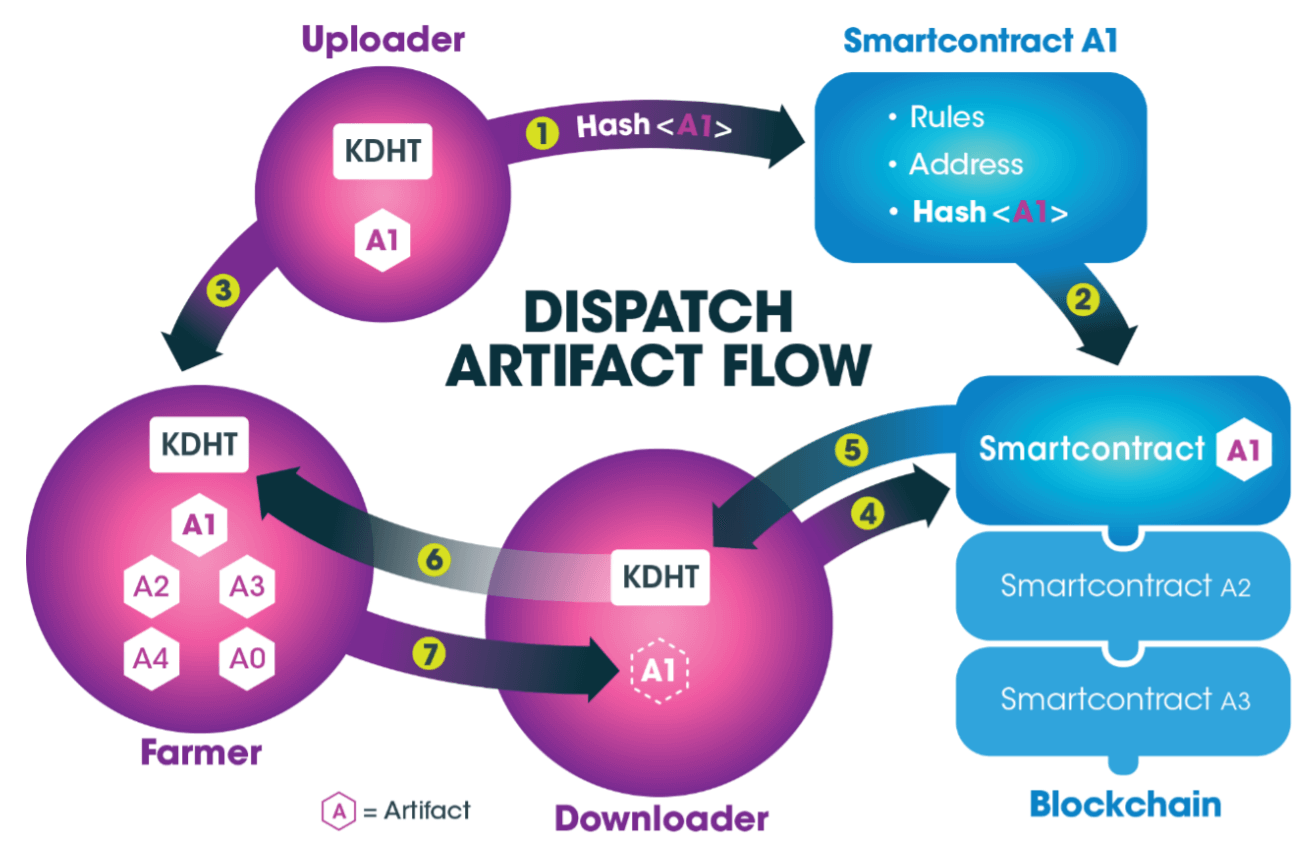
The Dispatch network works the following way:
- Uploader publishes a smart-contract containing a hash of the Artifact, and rules for accessing it. Hashing is used to index the data and keeps the entirety of Artifact unknown to other nodes in the network.
- The uploader can set the rules for accessing the Artifact can be based on time, price, user group, oracles, etc. through a smart contract. Once the smart contract is published to the shared ledger, anyone can request the Artifact from the uploader.
- Downloaders will know they received the right Artifact when the hash of what they received matches the one in the shared ledger.
- Uploaders pay farmers to serve encrypted copies of their Artifacts to service more downloaders, and to mitigate downtime.
- Farmers are compensated for their storage as well as their bandwidth. But farmers shouldn’t be paid until they prove they have held the file for the duration of the storage contract.
When a downloader wants an Artifact, they can reference their database (Kademlia DHT) to find the closest available farmer. Proof-of-Replicate (PoRep) will disincentivize farmers trying to game the system by pretending to be multiple farmers hosting the same file. When downloading an encrypted Artifact from a farmer, the set exchange consensus between farmers and downloaders are governed by the Make it Happen (MiH) protocol to weed out dishonesty.
(See more: Guide on Identifying Scam Coins)
Unique Selling Point
There are several elements that make Dispatch Lab’s unique:
- Scalability Solution: In order to achieve enterprise-ready ro for businesses, Dispatch employs an off-chain distributed storage network that can support massive data capacity and a Delegated Asynchronous Proof of Stake (DAPoS) consensus mechanism that can process far higher transaction rates as compared to traditional blockchains. The integration of an off-chain storage system to the Dispatch Virtual Machine (DVM) allows for smart contract programmability with off-chain data.
- Incentivization of Validators: Transaction validators (delegates) in Dispatch’s network are paid for their time (like a salaried position) rather than the conventional route of a majority of blockchains where miners are paid for each transaction (via fees).
(Read also: Guide to Valuing Cryptocurrency: How to Value a Cryptocurrency)
Team
Here is Dispatch Lab’s Core team:

Dispatch is headed by Matt Mcrgaw, an entrepreneur that has led and scaled a range of technology companies. He is a board member of multiple companies and high-growth start-ups that include SparkX, Berrett-Koehler Publishers. On the technical side, Zane Witherspoon (CTO) leads the blockchain development of Dispatch solutions. Zane specializes in distributed systems and blockchain architecture, with deep knowledge on the engineering/technical end. The operational side is led by Patrik Wijkstrom (COO), a technology expert with over two decades of application development. He was the CEO of SparkX, a B2B FinTech company using AI and Blockchain technology.
Dispatch features individuals with a wide-array of experienced skillset, that notably include:
- Zachary Fallon (Senior Legal Advisor), a former SEC lawyer
- Shadan Azali (VP of Investor Relation), corporate philanthropy lead at Bank of America and former adjunct professor at the Columbia School of International and Public Affairs
- Greg Mcgregor (VP of Engineering), inventor of pre-paid wireless with more than 30 years in mobile technology development
- Muhammad Al-Abdullah (Director or Research & Development), technology expert specializing in security, information engineering and cloud computing. He is also an assistant professor at the University of San Fransisco
The current size of Dispatch’s team is close to 30 individuals, which is a positive sign of diversity and robust development.
(See also: Analyzing Cryptocurrency Risk: Existing Coins vs ICO)
Traction
Partnerships

Our interview with Dispatch Labs suggests there are already 9 businesses that are already working to develop applications and leverage on Dispatch’s solution. Additionally, there are around 25-30 companies that have expressed their commitment in using Dispatch’s blockchain. Some notable ones include:
- Bucket Technology: A technology platform that integrates with existing POS systems to facilitate coinless cash transactions at retail locations
- Nanovision: A subsidiary of Nano Global that manufactures nano-sized chips and delivers nanotechnology-powered innovations for molecular data research
- Utopi: A blockchain-enabled platform that delivers streaming video services
As Dispatch’s DVM is backwards compatible with EVM, developers can already start building their proof-of-concept on Ethereum before the mainnet launch of Dispatch, which is scheduled to be on the 3rd quarter of 2018.
Testnet 2.0
Dispatch’s testnet went live on the 19th of June 2018, featuring several enhanced functionalities that include:
- Smart-Contracts capabilities (Solidity/EVM byte-code compatible)
- More robust security for the DAPoS Consensus Algorithm
- BigInt support (for all those little Divvitos)
- Grpc network pooling upgrades
- Tons of bug fixes
Here is Dispatch lab’s Github repository that features its testnet. Here is a screenshot of the testnet’s wallet:
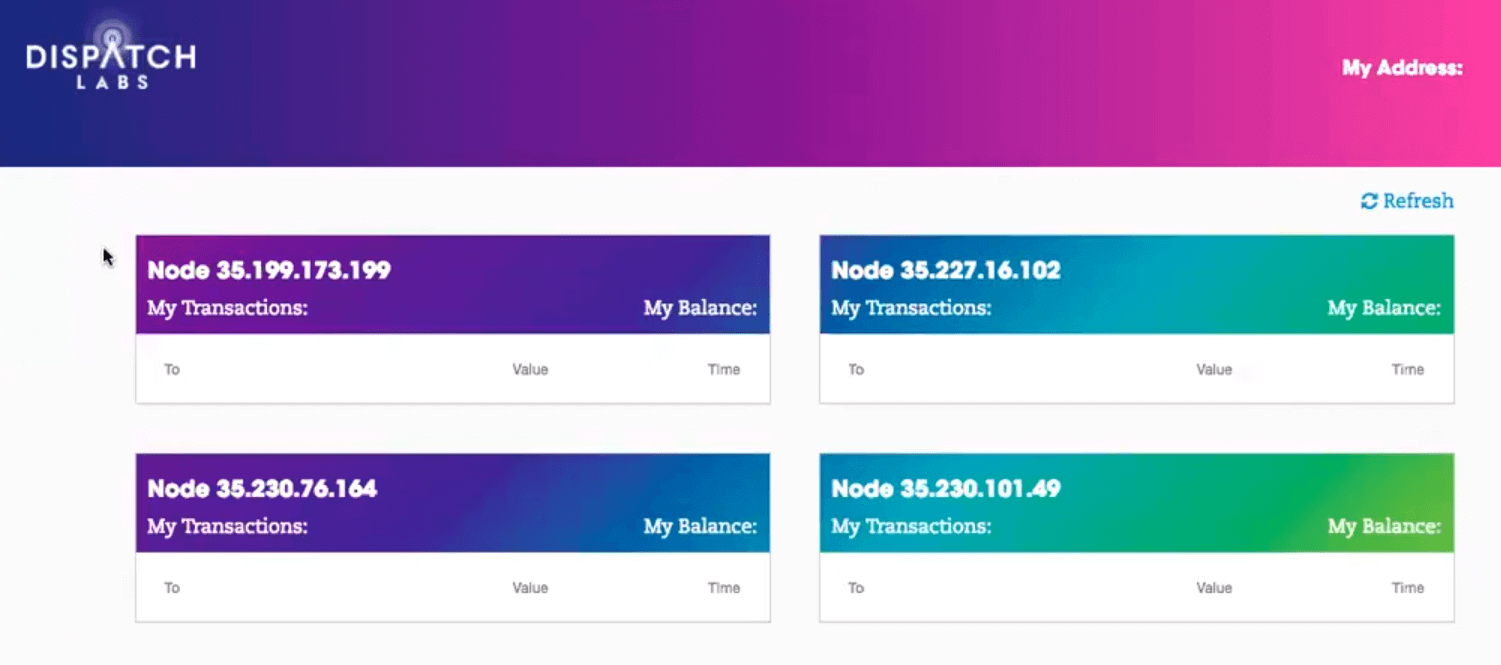
Mobile Wallet
Dispatch has just launched their mobile wallet on the play store (both Android and Apple). Here is the user interface:
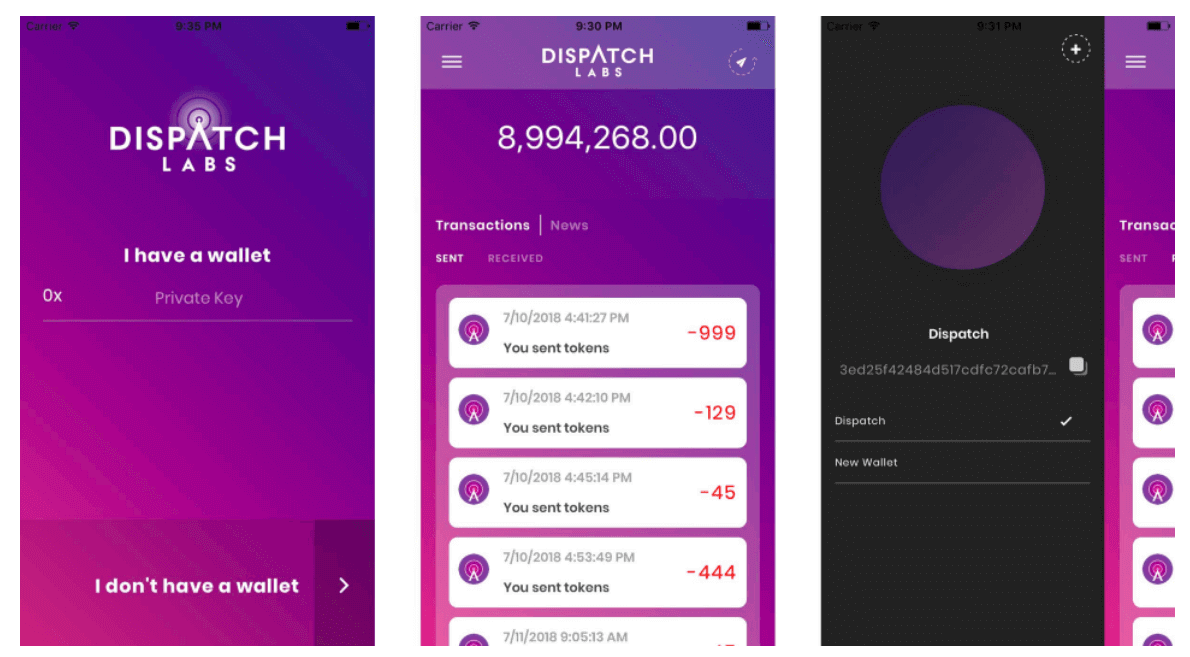
Since it is newly-released, there’s insufficient traction to assess the user experience of Dispatch’s mobile wallet. However, navigating the wallet is intuitive due to its simple user interface.
(Read more: Crypto Beginners Guide: 5 Things Crypto Newbies Should Know)
Roadmap
Here is Dispatch Lab’s roadmap:
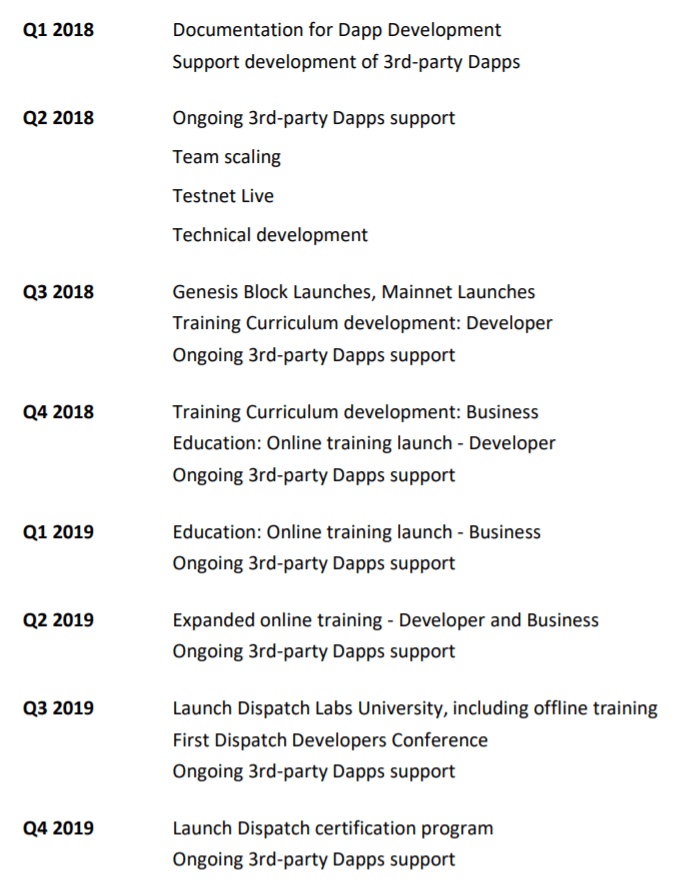
Dispatch plans to support education, community and financial support around its ecosystem by creating online and offline curriculums, certifications for businesses and developers, open source documentation and tools, as well as a direct communication line between the core team and interested parties. With the collated materials, they plan to create a Dispatch Online University, an educational resource for migrating business to blockchain and developing Dapps on the Dispatch Labs architecture.
Dispatch will launch their mainnet on the 3rd quarter of 2018, which is a positive sign of robust development. Compared to its direct competitor (PChain, which will launch its mainnet in 2019), Dispatch has a real chance in leading the enterprise-ready, blockchain market.
Token Economics
Dispatch hasn’t officially released any details on their token economics. After some digging, here are some plausible numbers that we can expect:
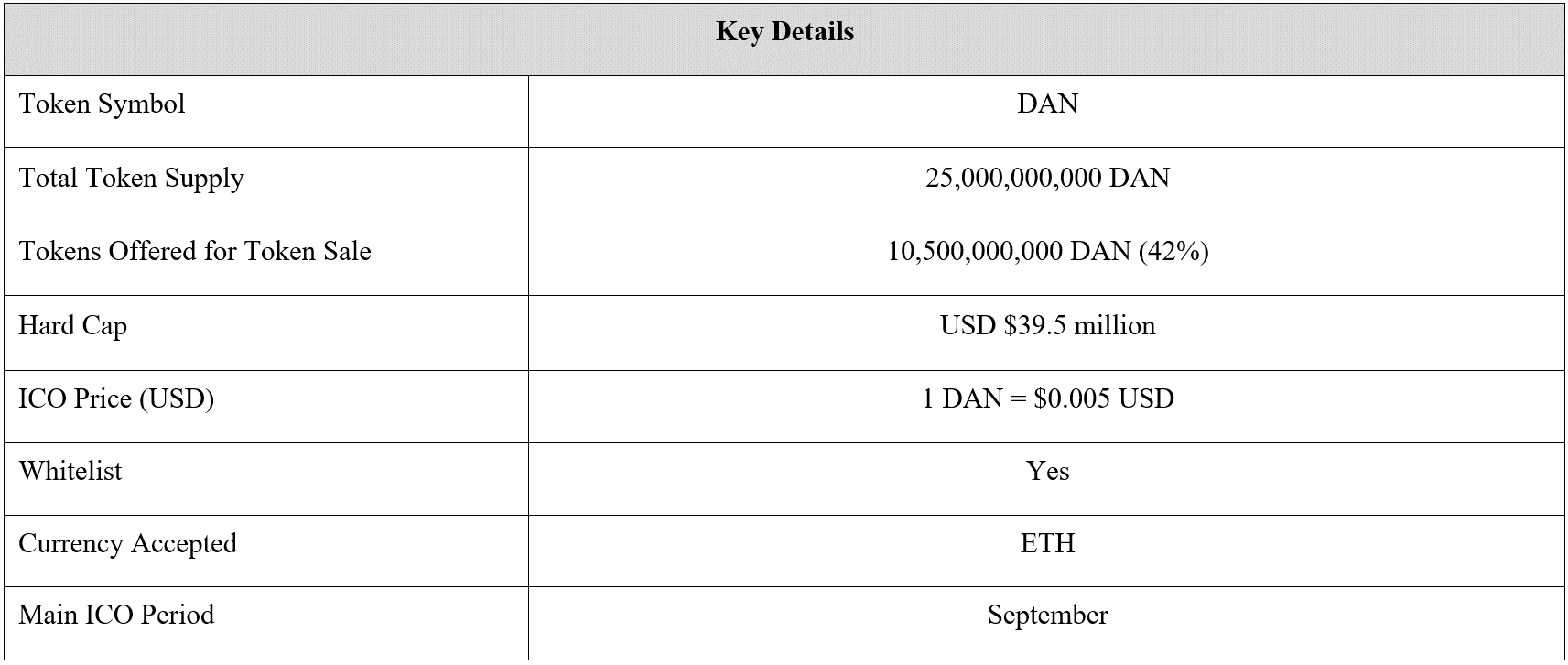
As stated by the founders in the interview, Dispatch has garnered huge interests from private and institutional investors. Unlike many other private projects that does not open up public allocation if private funding is adequate, Dispatch will allocate a certain portion towards the public sale. This is a positive approach since Dispatch recognizes the importance of the wider community in ensuring its success.
Token Utility
The Dispatch ledger will have its own native tokens called DAN, which will be the main currency in the Dispatch network. Dispatch’s native token will have similar functionality and utility of Ether (ETH), which is to serve as the medium for virtual machine computation. However, instead of gas being consumed in Ethereum’s case, the Dispatch scenario will feature bandwidth being utilized. An added utility of the DAN is that stakeholders that seek to utilize or participate in the off-chain storage network facility – called the Dispatch Artifact Network – will transact in DAN tokens.
Therefore, the value of DAN tokens will increase proportionally with the usage and traction of the Dispatch network. Given the partnerships that have been established and the infrastructural support afforded to developers, the utility of DAN looks solid in the long-term.
(Read also: Bitcoin vs Alt Coins Returns: Comparison of Gains Between Bitcoin & Altcoins Investing
Strengths
- First Mover’s Advantage: Dispatch is the first bloc)cryptocurkchain protocol to leverage on-chain smart contracts to manage distributed storage of application data off-chain, and its novel architecture enables for scalability for enterprise usage. This is a huge opportunity for large-scale adoption in the cryptocurrency space.
- Credible Partnership Network: Even though the mainnet has yet to be launched, Dispatch already has 9 businesses developing on the Dispatch blockchain and close to 30 companies signaling commitment. For a relatively new project, Dispatch is proving to offer a viable, real-world solution for businesses wanting to leverage on blockchain technology. The fact that Dispatch has already secured business partnerships is testament to their appeal as a strong technological solution for businesses.
- Novel Consensus Mechanism: Dispatch’s blockchain utilizes Delegated Asynchronous Proof-of-Stake (DAPoS), a new consensus mechanism that allows for much higher transaction throughput and incur significantly reduced fee as compared to other blockchains. The layer of elected learners is a novel way to dissipate the degree of ‘centralization’ of elected delegates (which has often been a key issue in a POS/DPOS structure.
- Strong Team: Dispatch boasts an experienced and technical team that has expertise over a wide-range of industries.
- Infrastructural Support: Dispatch plans to support education, community and financial support around the new ecosystem by creating online and offline curriculum, certifications for businesses and developers, open source documentation and tools, as well as a direct communication line between the core team and interested parties. This will undoubtedly foster greater participation and easier onboarding for businesses or projects seeking to develop on Dispatch’s solution
Weaknesses
- Scalability Tradeoff: Using an off-chain solution compromises the fully decentralized nature of blockchains, since data not stored on the blockchain is less resistant to censorship. However, Dispatch focuses on the feasibility aspect of a blockchain solution since it is geared towards business use-cases. A positive note is that the addition of elected learners under the DAPoS consensus mechanism ensures that delegates will face greater accountability.
- Lacking Token Details: The token metrics and economics aren’t touched upon in any of Dispatch’s official documents and channels, which make it hard to value its tokens.
Summary
Dispatch Labs is leading the way in building enterprise-level blockchain solutions that could bring massive adoption from the institutional/business side, which is often overlooked in the cryptocurrency industry. Focusing on fine-tuning their technology and creating partnerships with real businesses, Dispatch already has one foot in this lucrative market. By enabling business applications to conveniently migrate to distributed ledgers without having to worry about scalability issues, businesses can look forward to a plethora of benefits afforded by blockchain technology to streamline and improve their traditional processes
Verdict: Excellent Project
(Read also: Evolution of Cryptocurrency: Replacing Modern Cash)
Beneficial Resources To Get You Started
If you’re starting your journey into the complex world of cryptocurrencies, here’s a list of useful resources and guides that will get you on your way:
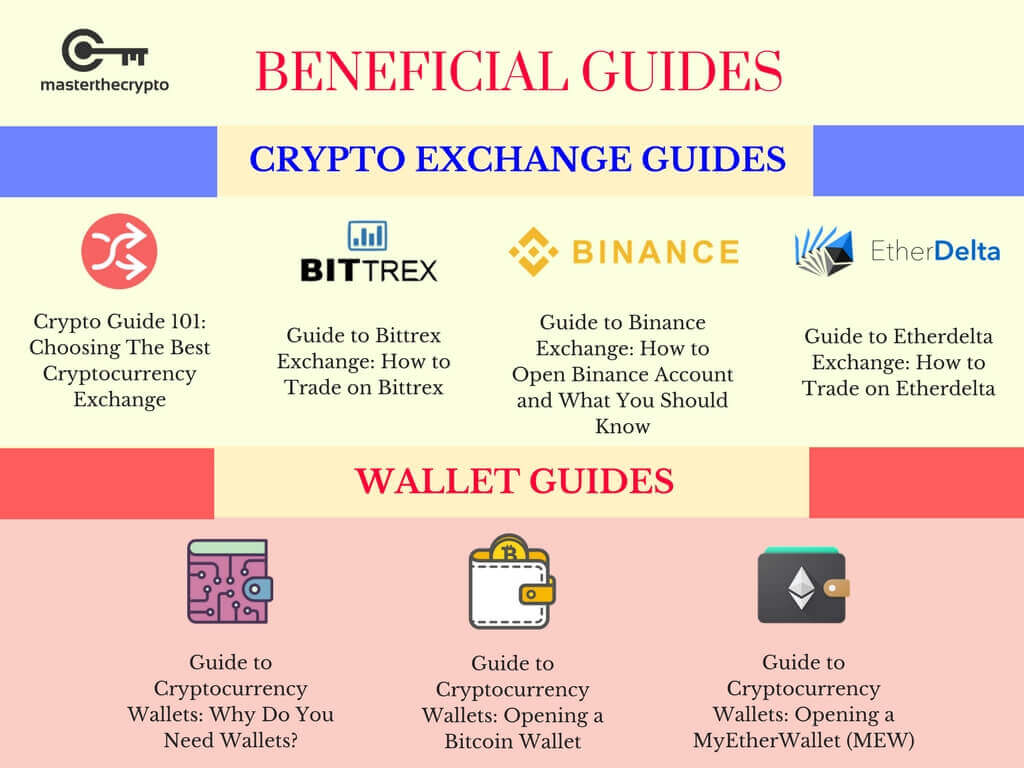
Trading & Exchange
- Crypto Guide 101: Choosing The Best Cryptocurrency Exchange
- Guide to Bittrex Exchange: How to Trade on Bittrex
- Guide to Binance Exchange: How to Open Binance Account and What You Should Know
- Guide to Etherdelta Exchange: How to Trade on Etherdelta
- Guide To Cryptocurrency Trading Basics: Introduction to Crypto Technical Analysis
- Cryptocurrency Trading: Understanding Cryptocurrency Trading Pairs & How it Works
- Crypto Trading Guide: 4 Common Pitfalls Every Crypto Trader Will Experience
Wallets
- Guide to Cryptocurrency Wallets: Why Do You Need Wallets?
- Guide to Cryptocurrency Wallets: Opening a Bitcoin Wallet
- Guide to Cryptocurrency Wallets: Opening a MyEtherWallet (MEW)
Read also: Guide on Privacy Coins: Comparison of Anonymous Cryptocurrencies and Guide To Cryptocurrency Trading Basics: Do Charts & Technical Analysis Really Work?
This represents the writer’s personal opinions and does not – in any way- constitute a recommendation of an investment or financial advice. Please assume caution when investing in cryptocurrencies and do so at your own risk, as it is extremely volatile and you can lose your money.
Get our exclusive e-book which will guide you on the step-by-step process to get started with making money via Cryptocurrency investments!
You can also join our Facebook group at Master The Crypto: Advanced Cryptocurrency Knowledge to ask any questions regarding cryptos!
I’m Aziz, a seasoned cryptocurrency trader who’s really passionate about 2 things; #1) the awesome-revolutionary blockchain technology underlying crypto and #2) helping make bitcoin great ‘again‘!
The post ICO Analysis: Dispatch Labs ICO Review appeared first on Master The Crypto.









